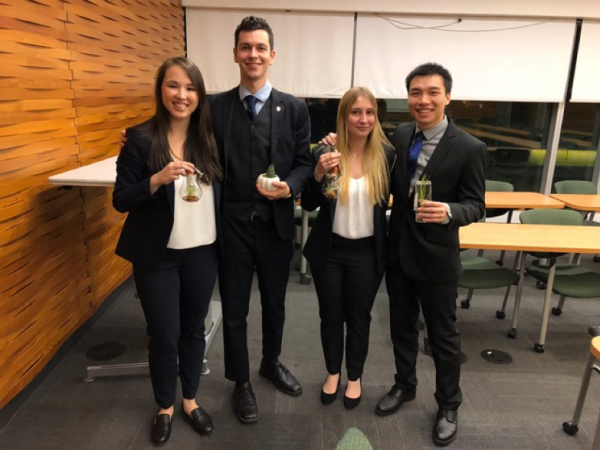One team of two first-year TRU law students rose to the top while their other TRU colleagues honed their skills and learned from competing at the fifteenth annual Environmental Negotiation Competition hosted by UBC’s Peter A. Allard School of Law.
The Nov. 2 event drew 21 teams from the province’s three law schools; TRU entered ten two-member teams, all of them first-year students.
Paige Mueller and Courtney McLaughlin walked away with the top prize. However, all of the students who attended found the experience valuable.
“I think being able to participate in such an event is wonderfully affirming and shows how our way of thinking has changed and that we have already learned so much. The neg
otiations themselves were a lot of fun and it was exciting to be able to apply feedback and really see how much you can learn and evolve between rounds 1 and 3,” said McLaughlin.
Although most law school moots focus on the adversarial process of a court case, negotiation requires students to think about the interests and positions of the parties, and come to creative solutions.

Some of the TRU moot team members: (left to right) Paige Mueller, Jake Harrigan, Courtney McLaughlin and Justin Leung.
The moot was a unique experience for first years, said Cory Song.
“We had to focus on a different set of skills than what we usually do. I enjoyed the collegiality we showed in representing our school,” he said.
Teams had one week to prepare their positions before the competition. This year’s competition saw the teams try to resolve a problem of a declining moose population after a devastating forest fire hit the region. The teams represented either the government, a local First Nation or the local fish and wildlife association.
TRU Law associate professor Chris Hunt and assistant professor Ryan Gauthier, chair of the TRU Law Moot Committee, gave brief advice to the students about negotiations before they headed to Vancouver.
The competition had two preliminary rounds. The top-performing teams from each of the three groups/sides moved on to the final round. Students got feedback from the judges, who are practicing lawyers, which Jake Harrigan found valuable.
“The judges went above and beyond in guiding and mentoring during the event. Their feedback helped us drastically improve the way we approached negotiating. I can genuinely say that I was different negotiator by the time of the finals than I was at the beginning of the event,” he said.
The final round of the competition was an all-TRU affair. The three teams, Ashley Dellanzana and Marissa McGarry (the government), Jake Harrigan and Justin Leung (the First Nation), and Mueller and McLaughlin (the fish and wildlife association). They were given a new set of facts, and had little time to prepare before sitting down to negotiate in front a panel of esteemed lawyers with experience in energy law, environmental law, and aboriginal law: Charlene Hiller, Paul Wilson and Nardia Chernawsky.
The TRU Law students drew on the most important skills lawyers need: to represent clients and their interests, to solve problems and to be collegial with those both on your side and on the opposite side of the table.

